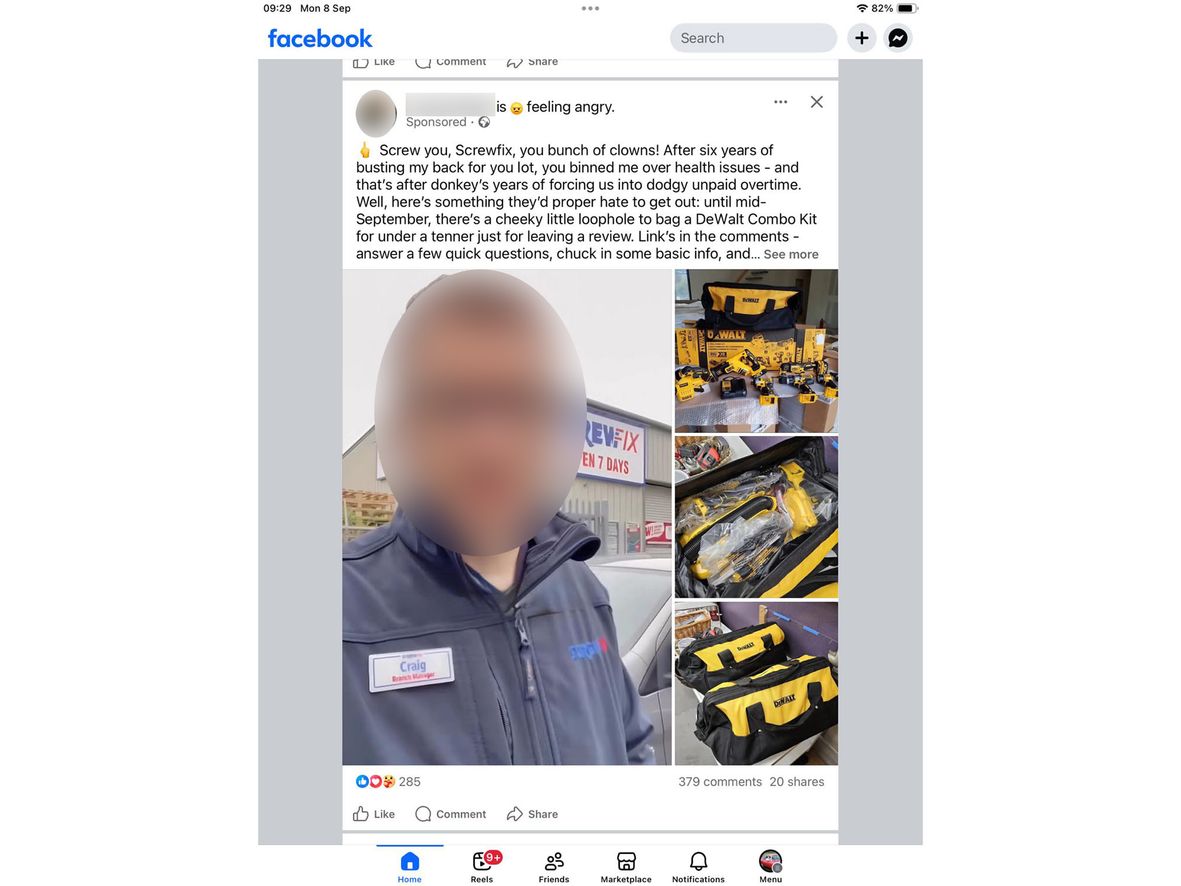Fake Facebook competitions linked to subscription traps, warns Which?

Facebook users are being lured into expensive monthly subscriptions by scammers peddling 'mystery boxes' and cheap goods from retailers such as Boots, Decathlon and Screwfix.
These fake giveaways, promising everything from backpacks to beauty boxes for just a few pounds' delivery fee, can result in repeated charges for subscriptions to random, unwanted websites, many of which subsequently disappear.
So far this year, we’ve received 42 reports of social media competition scams to our Scam Sharer tool. Of those, 38 named Facebook as the source and 25 told us they lost money after being signed up for subscriptions they didn’t intentionally authorise.
Here, we expose the telltale signs of these fake competitions and explain how to get your money back if you've been caught by one.
Bogus Decathlon survey linked to Cyprus-based subscription
In February this year, we uncovered a fake Decathlon deal being spread by various suspicious accounts on Facebook.
The posts claimed things like: ‘Don’t buy a North Face backpack until you read this! My sister works at Decathlon and told me about a special offer that not many people know about. Anyone can get a North Face Borealis Classic backpack at the special price of £3! All you need to do is answer a few simple questions. It only takes 30 seconds. Share this message with your friends and family.’
The surveys, which used stolen Decathlon branding, asked a series of simple questions before declaring every visitor ‘the lucky one’, with only two minutes to claim a backpack.
Which? researchers found that at least one of these fake surveys hid small print at the very bottom of the webpage (visible only if you were to scroll down). The small print revealed that anyone entering their card details would be charged for a subscription to a website called ‘blogzone.io’ – run by a company in Cyprus called Artez Ltd – costing £3 for three days and £46 every 14 days thereafter.
We contacted Artez Ltd, accusing it of running a scam, and reported the posts to Meta (which owns Facebook), but didn’t hear back from either. We also reported the post to Facebook using its internal reporting system and were told it didn’t violate Facebook’s Community Standards. Most of the accounts we highlighted haven’t been removed.
Decathlon confirmed to Which? that the users we reported had no relation or approval from it in any way.
Watch our video to see how this Decathlon scam works.
‘My daughter works at Boots and shared a little secret….’
You’ll usually find fake deals being shared by what appear to be ordinary users, often citing a relative who has the scoop on a ‘secret discount’.
One such Boots deal was reported to our tool by seven people. They saw posts from users who said: ‘My daughter, who works at Boots, let me in on a little secret the other day. If you’re over 40, you can fill out a short survey and snag the Elemis Ultimate Skincare Set for under £10!’
A similar tactic is to pretend to be a disgruntled employee giving away company ‘loopholes’ to get hefty discounts, as with a Screwfix scam reported by 10 people this year. One of them was Paul, who completed the survey, hoping for a cheap DeWalt toolkit that never arrived.
‘I then found a regular £60 being taken from my bank account for a game designer firm I have zero interest in. The name of the company that took the money was ‘webgamesassist.com’. I didn't receive an email about signing up for a subscription. I contacted them and they stopped future payments, but offered no refund.'
We attempted to contact the company behind ‘webgameassist.com’ using contact details previously listed on its website (which has since been taken down). However, the inbox was no longer in use, and we therefore didn’t hear back.
Screwfix confirmed that these posts are scams, telling us: ‘We continue to call on Meta to deploy proactive measures to identify scam posts, and to act faster to remove them more efficiently.’
Don’t fall for the £10 Fortnum & Mason hamper scam
A more recent scam to avoid is the sub-£10 hamper from Fortnum & Mason. We’ve seen two dodgy Facebook accounts claiming to have ‘insider info’ about this non-existent deal.
One said: ‘I was just about to place my order when my brother (who works at Fortnum & Mason) told me something crazy. If you're over 40, you can fill out a short form and receive a luxury gift hamper for less than £10.’ The other used near-identical language, this time saying the deal is ‘quite unbelievable’ instead of ‘crazy’. Both posts feature comments from other Facebook users, claiming theirs arrived in days – a quick check reveals these accounts are likely fakes (with very few friends and posts).
If you were to click on one of the links provided, you’d be redirected to a website that uses Fortnum & Mason branding but has nothing to do with the upmarket department store. If the promise of luxury teas and biscuits proved to be irresistible and you entered your card details, you could easily miss that your money would actually be sent to a website called ‘petsormore.com’, another company based in Cyprus.
Although the price appears to be only a one-off £9.99, scrolling down reveals that you would be charged a ludicrous £69.23 every 14 days, with no details about what this extremely expensive subscription covers.
We approached ‘petsormore.com’ about this fake competition but didn’t receive a response.
Watch our video to see how this scam works.
Meta responds
Meta, Facebook's parent company, is currently investigating the content we brought to its attention.
Meta didn't provide a comment, but it encourages users to report activity such as this (by clicking the three dots in the upper right-hand corner of an advert or post). It works closely with law enforcement to support investigations and keep scammers off its platforms.
You can find information about the latest scams and tips to avoid them via Meta's Anti-Scam hub.
How to get your money back
If you spot a recurring payment you didn’t authorise, first contact your card provider and explain that you were tricked by a fake competition on social media.
Your provider should put a stop to future payments if you're unable to cancel a subscription. However, getting a refund for money you’ve already lost can be more difficult, as it may appear to be a fully authorised transaction.
If the subscription company in question won’t refund you, ask your bank to help, explaining that these payments were not authorised (and it’s not simply a ‘dispute’ with a reputable retailer).
If you've exhausted your complaint with your card provider and you're not happy with the outcome, you can escalate your case to the Financial Ombudsman Service (FOS).
When it reviews complaints, the FOS will look to see if the firm in question adequately explained its pricing model and made it clear that the customer was signing up for a subscription. If it didn’t, it’s likely the payments would be considered unauthorised payments, which should be fully refunded.
If you can, always report the scam to Action Fraud or by calling the Police on 101 if you live in Scotland.





